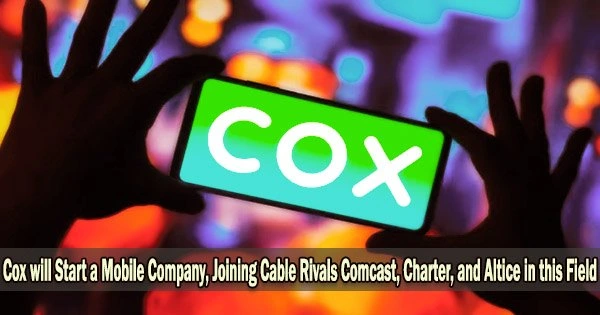The official launch of Cox Communications’ mobile business is how the company is welcoming in the new year.
Cox Mobile’s national debut was announced by the privately held cable and internet provider on Thursday (January 5, 2023) at the Consumer Electronics Show in Las Vegas. The announcement would be made at CES, according to a previous CNBC report.
Cox has lagged behind rivals like Comcast, Charter Communications, and Altice USA, which just began providing mobile service to their consumers and have been rapidly increasing their client base.
Like Comcast and Charter’s services, Cox Mobile will only be available to new and existing customers. Cox has 7 million customers in 18 states, and has started quietly offering mobile service in certain markets in recent months.
To encourage users to stay with their broadband plans, cable operators started offering mobile service. This is more true than ever now that these company units are on the verge of profitability.
Although it lately picked up speed, cable companies have been losing pay-TV subscribers who choose streaming-only options. However, as competition has increased and consumer moving activity has stagnated due to a slowing property market, the expansion of broadband subscribers has stopped in recent quarters.
“I think now they’re reusing wireless as a way to reinforce their broadband business. There’s not much profitability in it yet, but that’s not their concern. The concern is holding on to broadband customers,” said John Hodulik, an analyst at UBS.
How the competition shapes up
Although wireless companies like AT&T, Verizon and T-Mobile hold the large bulk of wireless customers in the U.S., Comcast and Charter’s mobile businesses have been growing at a faster rate due to cheaper and more flexible plans.
Charter’s Spectrum Mobile offers a $30 unlimited data plan, or $14 by the gigabyte of internet used in the month plan. Similarly, Comcast’s Xfinity Mobile starts at $30 for unlimited data, or $15 by the gigabyte.
Because they can rely mainly on hotspots and home broadband Wi-Fi for data usage, these solutions are less expensive. When their mobile clients switch from Wi-Fi to a network, Verizon, a partner operator of Comcast and Charter, receives them, keeping a portion of the revenue for the wireless provider.
Cox Mobile will offer similar plans, unlimited at $45 a month or $15 by the gig. Cox confirmed at CES on Thursday that it is also working with Verizon as its network partner.
A wrench was thrown in Cox’s plans to launch its mobile business when T-Mobile sued the company in 2021, saying Cox was obligated to pursue a partnership with them. Earlier this year, a Delaware court judge reportedly ruled in Cox’s favor.
Charter said it had 4.7 million wireless customers as of Sept. 30, while Comcast said it reached 5 million.
“We started off with this reimagined mobile service because we knew customers would spend a significant amount of time on Wi-Fi,” said Danny Bowman, chief mobile officer at Charter, adding Spectrum Mobile customers spend about 85% of their time on Wi-Fi.
“By keeping the mobile package simple, we have exponential growth,” Bowman added. Charter and Comcast also allow customers to bring their own devices, an option Cox won’t yet offer. Currently, customers must purchase Samsung phones through Cox for service.
‘We need to do this’
Smaller cable operators are also seeing the value in offering a mobile plan to customers.
The National Content and Technology Cooperative, or NCTC, an industry group made up of more than 700 cable and broadband providers, has been in discussions to create a mobile offering for its members.
“It’s become such a focal point. It’s the thing everybody seems to think is what you need to have,” NCTC President Lou Borrelli said of mobile offerings. “I’ve seen it referred to as the new bundle. I don’t dispute that.”
Since NCTC’s membership includes small providers many in rural areas the cooperative started discussions with wireless operators last year on behalf of its entire base.
Borrelli said NCTC hadn’t been in a rush to offer mobile until it saw how Charter and Comcast did in net additions in 2021. “I remember getting calls from some of our board members saying, ‘You know, maybe we should look at this,’” he said.
NCTC’s negotiations should wrap up this year, Borrelli said. Some have already added mobile. Colorado-based WOW! Internet, Cable & Phone unveiled a mobile plan in July through a partnership with Reach Mobile.
Borrelli said consumer research in certain markets showed companies had no choice in the matter. “Members have told us they don’t care what the results are, we need to do this.”
















